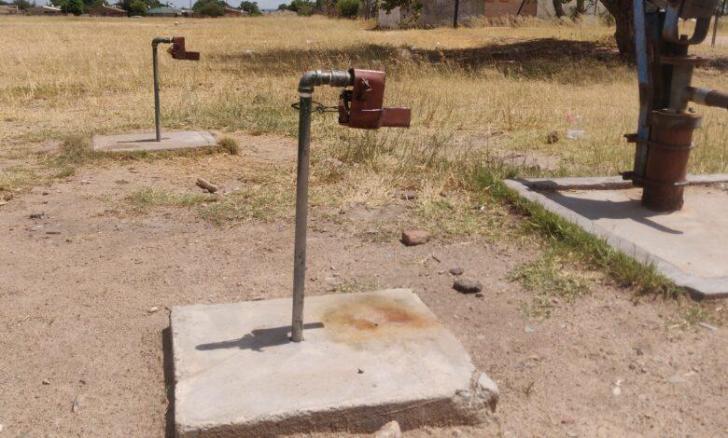News / National
Zinwa leaves incomplete borehole projects in Bulawayo
14 Nov 2024 at 15:21hrs |
0 Views

Pelandaba-Tshabalala MP Joseph Tshuma has publicly criticized the Zimbabwe National Water Authority (ZINWA) for its failure to deliver functional boreholes in Bulawayo, leaving residents without adequate water solutions amid persistent shortages. Addressing Parliament on Wednesday, Tshuma accused ZINWA of "drilling holes, not boreholes," citing instances where the authority left boreholes unfinished, lacking essential equipment, fuel, and maintenance.
"ZINWA is drilling holes, not boreholes. They are just drilling and leaving it like that. There are so many holes that have been drilled," said Tshuma. "They do not come back to finish up by putting all the necessities so that water is then drawn. In Bulawayo, I just saw one borehole which was drilled and it was incomplete. I completed it with my own money."
In response, Minister of Lands, Agriculture, Fisheries, Water and Rural Resettlement, Dr. Anxious Masuka, acknowledged ZINWA's limitations, pointing to budget constraints and technical difficulties. Masuka explained that ZINWA's current approach is to drill holes as a preliminary step, with plans to equip them when funds become available.
"When we say we need resources to complete boreholes as planned, this is precisely what we mean," Masuka replied. "We have 31 drilling rigs which we have already acquired. We will drill the boreholes and leave a hole. It is actually good progress."
Minister Masuka outlined ZINWA's efforts as part of the Presidential Rural Development Programme, which aims to provide boreholes for 35,000 rural villages, prioritizing drought-prone areas with up to five rigs while allocating only one rig to Bulawayo.
Pumula MP Sichelesile Mahlangu pressed for specifics, stating that many water-scarce areas in Bulawayo remain unserved. "The Minister said boreholes were drilled in Bulawayo, but where exactly? People in hotspots still lack water access. We need a clear list of locations and timelines for outstanding projects," said Mahlangu.
Dr. Masuka also pointed to geological challenges, particularly in regions with granite formations where drilling deeper does not guarantee finding water due to a lower-than-expected water table. He explained that ZINWA plans to revisit open boreholes after the rainy season, anticipating that higher water tables could make the sites viable for water extraction.
"We need specialist knowledge. If we combine scientific methods with indigenous knowledge systems, we may better identify water sources," Dr. Masuka added.
With pressing concerns raised by MPs, the water minister acknowledged the need for further research and reallocation of resources to meet the urgent water needs of affected communities.
"ZINWA is drilling holes, not boreholes. They are just drilling and leaving it like that. There are so many holes that have been drilled," said Tshuma. "They do not come back to finish up by putting all the necessities so that water is then drawn. In Bulawayo, I just saw one borehole which was drilled and it was incomplete. I completed it with my own money."
In response, Minister of Lands, Agriculture, Fisheries, Water and Rural Resettlement, Dr. Anxious Masuka, acknowledged ZINWA's limitations, pointing to budget constraints and technical difficulties. Masuka explained that ZINWA's current approach is to drill holes as a preliminary step, with plans to equip them when funds become available.
"When we say we need resources to complete boreholes as planned, this is precisely what we mean," Masuka replied. "We have 31 drilling rigs which we have already acquired. We will drill the boreholes and leave a hole. It is actually good progress."
Minister Masuka outlined ZINWA's efforts as part of the Presidential Rural Development Programme, which aims to provide boreholes for 35,000 rural villages, prioritizing drought-prone areas with up to five rigs while allocating only one rig to Bulawayo.
Pumula MP Sichelesile Mahlangu pressed for specifics, stating that many water-scarce areas in Bulawayo remain unserved. "The Minister said boreholes were drilled in Bulawayo, but where exactly? People in hotspots still lack water access. We need a clear list of locations and timelines for outstanding projects," said Mahlangu.
Dr. Masuka also pointed to geological challenges, particularly in regions with granite formations where drilling deeper does not guarantee finding water due to a lower-than-expected water table. He explained that ZINWA plans to revisit open boreholes after the rainy season, anticipating that higher water tables could make the sites viable for water extraction.
"We need specialist knowledge. If we combine scientific methods with indigenous knowledge systems, we may better identify water sources," Dr. Masuka added.
With pressing concerns raised by MPs, the water minister acknowledged the need for further research and reallocation of resources to meet the urgent water needs of affected communities.
Source - cite
Join the discussion
Loading comments…
























